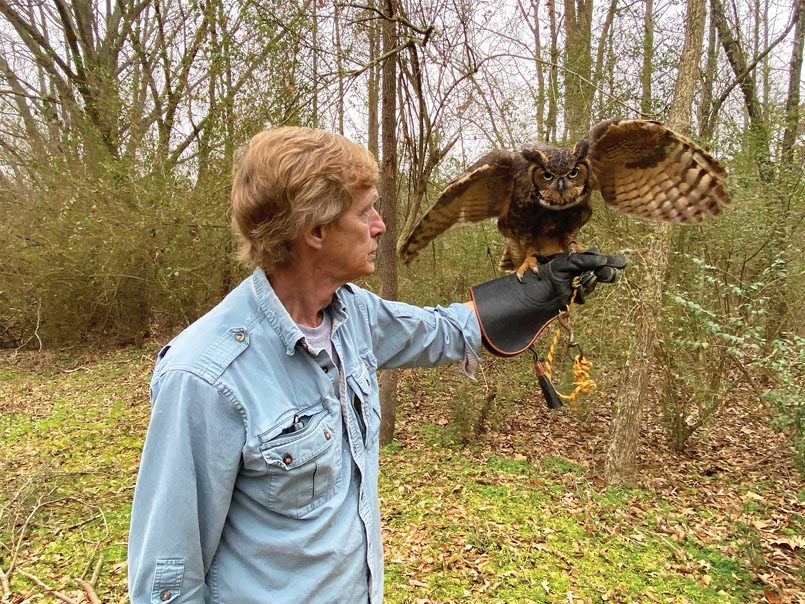28 Feb 2022 El Paso’s Rodney Paul working to rehabilitate large birds
By Judy Riley
When Rodney Paul moved to Central Arkansas with his job in the aerospace industry, little did he know he would ultimately become a raptor rehabilitator, and a really good one at that.
He began volunteering at the Little Rock Zoo and became fascinated with birds of prey, commonly called raptors. He either wanted to help injured birds or try his hand at falconry, a method of hunting small animals with trained raptors as hunting aides.
He knew he wouldn’t have time for both, so he bought a house and land in El Paso and began a nonprofit now called Raptor Rehabilitation of Central Arkansas, and is one of only six federally permitted raptor rehabilitators in Arkansas.

Raptors are opportunistic carnivores, eating live or dead animals depending on availability, according to Paul. Common raptors in Arkansas are bald eagles, vultures, hawks, and owls. An often unnoticed but common raptor is the Mississippi kite. They are known to farmers as they follow farm equipment to search out insects. Katydids are their delicacies. Other raptors like vultures or hawks are commonly seen looking for a meal of mice, rabbits, or road kill.
Paul has rehabilitated more than 2,000 birds since he began this business 20-plus years ago. He takes in sick, injured, or orphaned birds. They see injuries from road accidents, an occasional bird that is shot, or a baby bird lost from a nest. Their mission is to release as many birds as possible back into their natural habitat. The rehabilitation process can include surgery, bandaging, even reacclimating to their habitat. Paul erected a flight cage to help injured birds relearn to fly. When baby birds arrive, he tries to keep them from imprinting on humans, even isolating them, so they will more easily acclimate to their natural habitat when released.
And he is quick to give credit to his volunteers. A short visit to the facility revealed an enthusiastic, energetic, and committed group of volunteers.
Tina Miller of El Paso is a registered nurse at Conway Regional Hospital but spends as much time as possible volunteering with Paul. Because of her nursing skills, she does much of the bandaging of damaged birds. She admits to being a parrot person but began assisting Paul about 10 years ago. Asked why, she said she has fallen in love with the birds, especially those who have become permanent residents.
Larry Fliss, a retired accountant from Conway, got involved when studying to become a “Master Naturalist.” He volunteers several hours each week and is quick to do any chore assigned.
The husband-wife team of Gary and Amber Morris can be seen every Saturday helping take care of the birds. Gary is a University of Arkansas-Little Rock graduate student in biology, and Amber is a UALR graduate working at UAMS. They admit to being “bird nerds” with 14 birds at home, seven parakeets, and seven pigeons. Hendrix, UCA, and UALR faculty refer students to Paul. He takes them through four days of training before trusting them to care for the birds.
Birds who have lost their sight or were injured severely enough to lose their ability to fly, stay at the center and are used in its outreach. Paul and his volunteers conduct programs for various groups to share knowledge about raptors’ value to the ecosystem.
Every permanent resident bird has a name. The big horned owl is Bogart and is a favorite with school groups. Miller says they all have personalities and you get attached. One of the oldest residents is Phoenix, a Harris’s hawk who is 26. Shaheen, an 8-year-old peregrine falcon, can fly up to 200 miles per hour and uses sheer force when attacking his prey.
Currently, there are two bald eagles being rehabilitated. One has a wing injury; another a spinal injury. No state or federal funds are available to support their effort, so they depend on donations. Feeding the birds is costly; food for an eagle can cost $6 per day. For more information or to support the upkeep, contact the center through its website Raptor Rehab of Central Arkansas or Rodney Paul directly at [email protected].
Next time an eagle soars by in the sky, it just might be one rehabilitated with care and concern, right here in Central Arkansas!








